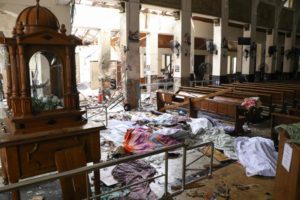It is with heavy hearts that we acknowledge the recent devastating attacks in Sri Lanka, which took some 310 lives, including many Christians celebrating Easter Sunday. The bombs ripped through three churches, three luxury hotels, and two other locations, leaving shock, death, and despair in their wake. Police have arrested 24 people in connection with Sunday’s attacks, the worst violence the South Asian island has faced since its bloody civil war ended a decade ago.
On Monday, government spokesman Rajitha Senaratne, revealed that warnings were received in the days before the attacks but the country’s intelligence and security apparatus failed to act: “We saw the warnings … We are very, very sorry, as a government we have to say — we have to apologize to the families and institutions about this incident.”
The Islamic State has claimed responsibility for the attacks, though no evidence has been offered to support this claim. Prior to this development, relatively unknown local extremist group National Tawheed Jamath was thought to be behind the bombings. There may be a link between these two entities, but knowledge of their alleged involvement and relationship is still developing. Further, Ruwan Wijewardene, the state minister of defense, alleged to Parliament that initial reporting indicated the bombings were carried out in retaliation for the New Zealand massacres perpetrated by a white supremacist on March 15 in Christchurch. On that dark day, 50 people perished at the hands of a single genocidal maniac. The man-who-shall-not-be-named shot 43 worshippers under the golden dome of Masjid Al Noor, then continued his killing spree at Linwood Islamic Centre across town, where he slaughtered seven more Muslims as they prayed.
The possible interweaving of these events reminds us that hate breeds hate. Mass atrocities and genocides throughout history mirror each other in startling detail, across cultures, religions, socioeconomic strata and time. Dehumanization, the demonization of the other, systematic preparations, attack, and denial run through them all. Terrorist attacks, when specifically targeting a distinct group of people rather than an abstract group of civilians, are in many ways mini genocides. When strung together, their impact — physical, psychological, societal — is devastating.
Writing for the Daily Beast, Rita Katz, who has been tracking jihadists for two decades, pointed out that “white supremacists and jihadists both leech off different ends of a tragedy” like Christchurch or Sri Lanka, contorting it to fit their agendas. “These parallel swells of incitements by both jihadists and far-right extremists in some ways strip both movements of their ideological veils, leaving behind a much barer look at extremism itself. For these violent groups and communities, such tragedies are mutually beneficial events,” Katz writes. “[E]ach of these events adds more fuel to extremists’ delusions of ‘Crusades’ and ethnic ‘invasions.’ They feed into their poisonous narratives that praying to one’s God, whichever one it may be, is an act of war.”
It comes as no surprise then that the massacres in Christchurch ignited an unprecedented surge in online violent extremism on both sides: white supremacists standing in solidarity with the assailant; jihadists using it as a tool of incitement and recruitment.
Our organizational ethos at Jewish World Watch (JWW) is to speak out any time a population is targeted because of who they are or what they believe. For that is the essential ingredient of genocide: the intent to destroy people simply because they belong to a distinct group, to wipe the human slate clean and annihilate “the other.” As an organization that sprung from Jewish principles, compelled to educate and engage the world so that it never again stands idly by in the face of atrocities, we bear witness and sound the alarm whenever we see the seeds of genocide, no matter whom the victims. Even if a situation doesn’t rise to the level of mass atrocity (i.e., a crime against humanity or war crime) or meet the high bar to be labeled a genocide, JWW and our constituents speak out against acts of violence that aim to foment divisive hatreds or destroy elements of the rich tapestry of our world.
Even as we all mourn with the people of New Zealand and Sri Lanka, as well as with Muslims and Christians the world over, we all must reject the rhetoric of collective blame. We must not fall into the traps set by extremists plotting to turn us against one another so they may replenish their coffers and their ranks.
In Sri Lanka, in particular, a country still recovering from protracted civil war and with a history of interethnic and religious tensions, strategic efforts must be implemented to avoid demonizing Sri Lanka’s overwhelmingly peaceful Muslim community. Warns the International Crisis Group, “inter-communal conflict and schism is precisely what ISIS hopes to provoke. Instead, leaders from all ethnic and religious communities must speak out against holding Muslims as a whole responsible for atrocities that a very small number of their community have committed.” Reprisals would only ignite a deadly cycle of intercommunal conflict.
The true target on Sunday was Sri Lanka’s hard-won, fledgling culture of inter-religious and inter-ethnic cooperation. This progress must be defended as steadfastly as possible by the upstanders of our world — those of us who refuse to stand idly by. Only by keeping our collective eye on the prize of harmony and by refusing to let progress be demolished through hate can we work towards a world in which “never again” is a reality.


